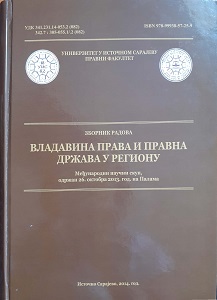Narodni suverenitet i princip vladavine prava u savremenoj državi naciji sa posebnim osvrtom na Bosnu i Hercegovinu
People's Sovereignty and the Rule of Law in the Modern State With Particular Review of the Case of Bosnia and Herzegovina
Author(s): Dženeta Miraščić
Subject(s): Law, Constitution, Jurisprudence, Governance, Nationalism Studies, Politics and Identity
Published by: Правни факултет Универзитета у Источном Сарајеву
Keywords: Nation-state;Rule of law;Principle of ethnic determinism;Nation;Sovereignty of the people;Discrimination;Citizen;Bosnia and Herzegovina;
Summary/Abstract: The modern nation-states represent the highest form of political organizing, so this is why they are presented with an extremely complex tasks related to the enforcement of the rule of law. Using the legitimate coercive apparatus, as well as all the mechanisms available to modern state-systems of law, nation-states are obliged to ensure the equality of all citizens as the primary political actors, and to protect them from all forms of discrimination and arbitrariness of the state authorities. Through consistent and full implementation of the principle of sovereignty of the people, modern nation-states are obliged to provide their citizens, regardless of their (non)membership to a particular social group, with assurance of their participation in the socio-political decision-making process under equal conditions. Furthermore, based on democracy as the rule of the people or the opportunities of equal and free members of the community and their rights to participate in public decision-making process, the modern nation-states, both on national and international level, are determined as the only subjects who can guarantee the protection and realization of fundamental rights and freedoms for all its citizens.The primary task of the modern states is to ensure the freedom and equality of all members of the specific socio-political community. But equality among individuals must necessarily be accompanied by appropriate state's instruments whereby government will guarantee to all citizens certain rights on the basis that will recognize their abilities, which will still result in enabling a common form of political action. However, despite numerous efforts, a significant number of states are not able to consistently and fully implement the idea of sovereignty of the people and the rule of law, which has resulted in the creation of the so-called systematic inequality of life chances which have serious consequences for citizens who are unable to participate in the work of public authorities. In this regard, it is absolutely impossible to achieve a stable and unified society within the nation-states in which common structure of political action is limited as a result of systematic inequality of life chances; thereby the process of decision making is becoming the sole privilege of the few.When it comes to Bosnia and Herzegovina, it is important to note that this is a pluralistic society which consists of a number of cultural, ethnic and religious communities, in which the “major role” of the socio-political decision-making process is played by three ethnic communities – constituent peoples: Bosniacs, Croats and Serbs, who, based on current normative regulations in the modern constitutional arrangements, enjoy privileges, certain rights and freedoms. Under provisions of the Constitution of Bosnia and Herzegovina, "most dominant" collectivities within Bosnian multicultural society - the constituent peoples - are guaranteed participation in the work of public authorities and they are thereby guaranteed proportional parity of representation at any level of government and in all major political institutions. In addition to parity and proportional representation, constituent peoples, at all state levels, can appeal for the application of mutual veto.In contrast to the Kingdom of Belgium and the Swiss Confederation, the states which are also subject to internal turmoil, as well as numerous requests for recognition of different status and rights, Bosnia and Herzegovina on the map of European (and global) states is defined as a state-legal community in which individuals (citizens) do not have the status of primary political subject, and also as a community in which there is no normative (and institutional) protection of individuals and their fundamental human rights and freedoms. Giving primacy to collectivities (constituent peoples), the Constitution of Bosnia and Herzegovina is deter-mined as one of the few constitutions in the whole world in which so-called undemocratic elements dominate, violating the basic postulates on which the entire modern international community is based. Under the provisions of the Constitution, the principle of the rule of law and the principle of “ethnic determinism” are proclaimed at the same time, which characterizes Bosnia and Herzegovina as a state that is located between the legal and authoritarian state's spheres.In Bosnia and Herzegovina it is necessary to set up such constitutional and legal frameworks that bring the principle of sovereignty of the people and the rule of law into the state-legal system and socio-political decision-making process. Bosnia and Herzegovina as Hegel's “organization of substantial freedom” shall be placed above all ethnic, religious and other existing communities, and shall allow to each citizen, on equal terms, free and complete realization of the basic rights and fundamental freedoms. Therefore, we suggest that all constitutional reforms go in the direction of the normative (constitutional) and institutional foundation of the Bosnia-Herzegovina nation. In other words, in the socio-political decision-making process, it is necessary that a nation of Bosnia and Herzegovina (citizens of Bosnia and Herzegovina) has priority over all existing cultural, religious and ethnic collectivities, in which process it is forbidden to negate or diminish the importance of the (specific) collective rights (and interests) that these communities and its members enjoy.
- Page Range: 268-297
- Page Count: 30
- Publication Year: 2013
- Language: Serbian
- Content File-PDF

